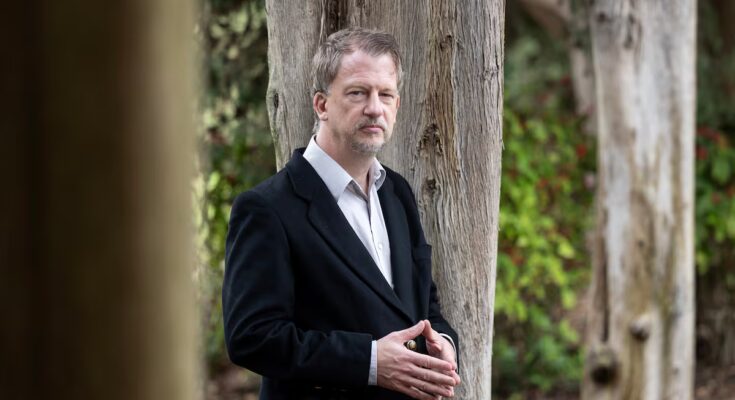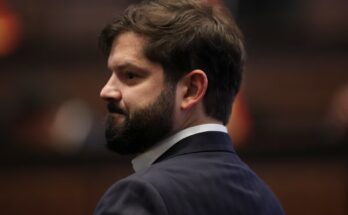Henrik Lenkeit, a Christian pastor and life coach living on Spain’s Costa del Sol, woke up one summer day in 2024 with his usual worries and life as it always was; more or less predictable. In a matter of hours everything changed and he became a different person. A year later, this German citizen, married to a Mexican citizen and father of three children, tells his story in fluent Spanish.
“I felt like I was in a pressure cooker,” he recalls. “My children had never seen me like this. I wasn’t myself.”
Lenkeit explains that, at the age of 47, he had just discovered “by chance” and with horror that his maternal grandmother, Hedwig Potthast (1912-1994) had been the lover of Heinrich Himmler, head of the SS and Gestapo, and one of the architects of the murder of six million Jews during Adolf Hitler’s Nazi regime. He discovered that they had had a son, Helge, and a daughter, Nanette Dorothea, during World War II. And that the daughter was her mother. And therefore he was the nephew of Himmler, the Nazi mass murderer and war criminal.
“I had to process all this,” Lenkeit says on the phone from Benalmádena (Málaga), where he settled seven years ago after moving from Mexico. “When 47 years of your life is a lie, a lot of your identity dies. I went through a period of mourning.”
It was August 20, 2024. That afternoon Lenkeit didn’t feel like reading the Bible and there was no football on TV. I started watching a documentary about Himmler. Intrigued, he searched for more information online.
“And I saw that Himmler had a mistress,” he says. “And I saw her picture and thought to myself, ‘She looks a lot like my grandmother.’ I compared it to the family album, and yes: it’s her. Her name is Hedwig: my grandmother’s name. His last name, Potthast. It wasn’t the last name she used, but I realized it was my great-aunt’s. Then I saw that with this super-Nazi he had two children, and I see the names of the children, which are those of my uncle and my mother. Another shock. If my mother was her daughter, then I am… can you imagine? This takes time to process.
It was a profound personal earthquake. Now he is preparing a book and talks about the experience that further motivates him to apply the Christian principle of helping others and immigrants. “A mission” and “an obligation,” he says.
To clarify any doubts about their origin after the discovery, Lenkeit contacted political scientist Katrin Himmler, author of a fundamental book on the family, The Himmler brothersand herself a great-granddaughter of Heinrich Himmler. He obtained Nanette Dorothea’s birth certificate, which recorded her date of birth as June 3, 1944. The document states that Heinrich Himmler recognized the daughter as the result of his extramarital affair with Hedwig Potthast, who had been his secretary and lover since 1938. Himmler committed suicide at the end of the war.
After having “evaluated birth certificates and family photos, consulted historians and contacted relatives”, the weekly Der Spiegelwho broke the story in October, concluded that Lenkeit was indeed Himmler’s nephew. Contacted by EL PAÍS, Katrin Himmler confirmed: “I have no doubt that he is the nephew.”
Another surprising element of the case is that Lenkeit didn’t find out who his grandfather was until the summer of 2024. If it was a secret, it was hidden in plain sight. The names of his mother and uncle appear in books such as the canonical biography of Himmler, written by historian Peter Longerich.
Hedwig Potthast was by no means unknown to scholars and was mentioned in films and documentaries. The transcript of her interrogation by the US Seventh Army in May 1945 describes her as “an attractive woman in her thirties who might fit the prototype of the Deutsche Frau“,” the German woman. The interrogation also reveals that she “gave birth to Himmler two sons.”
Potthast remarried in the 1950s and took a different name. He spoke very little about his past. Hedwig’s daughter, Nanette, received information about the identity of her biological father, Lenkeit says. But he regrets that this information was kept from him.
“Maybe they wanted to protect me…” he supposes. But how could it have taken him so long to find out? “I can’t explain it,” he replies. “It was so obvious…”
Katrin Himmler notes: “Nanette Dorothea remained silent until her death about who her biological father was, so, incredibly, it is entirely plausible that Henrik Lenkeit only found out who her grandfather was a year ago, and by accident.” “In Germany,” he points out, “there are still many families who maintain a stubborn silence about the past, and especially about the perpetrators within their own family, so their family was far from unique.” “I hope their story gives others the courage to ask questions within their own families about the Nazi era and the role their ancestors played in it,” adds the granddaughter of Ernst, Heinrich Himmler’s younger brother.
Lenkeit’s parents – his mother a doctor, his father a teacher – were politically moderate. They took their son to see the film Schindler’s List and admired Israel: a typical Federal Republic family, aware of the lessons of history. The son also observes that it was a family “distant in relationships with others”, who kept a low profile. She can’t help but see him in light of her rediscovered past. “There are things that are inherited. And there are generational traumas. My family inherited this sense of guilt,” he reflects, although the statement applies to most Germans who grew up after the war.
“In Germany,” Lenkeit continues, “there are many children and grandchildren of criminals, and they are not fascists. We are a new generation. Now a (far-right) party like the AfD has 26% in the polls. If I can do my part to prevent them from coming to power…”
Lenkeit’s experience may seem extraordinary. But it is not very different from that of many Germans who, while accepting collective responsibility for the crimes of Nazism, took longer to identify their grandparents as individual perpetrators or accomplices. Of course, very few had a grandfather like Himmler…
“When I think about it, he was a monster, and I have the blood of a monster,” he says. “My faith is what kept me going. Without faith, I could end up in a mental hospital.”
Sign up to our weekly newsletter to get more English-language news coverage from EL PAÍS USA Edition



